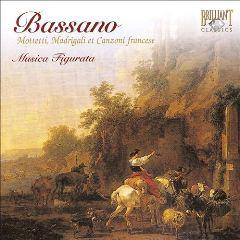Giovanni Bassano - Mottetti, Madrigali et Canzoni Francese (1999)
Giovanni Bassano - Mottetti, Madrigali et Canzoni Francese (1999)

1. Introduxit me rex di G. P.da Palestrina 2. Io canterei d'amor di Cipriano de Rore 3. Signor mio caro di Cipriano de Rore - Modo I 4. Signor mio caro di Cipriano de Rore - Modo II 5. Ancor che co'l partire di Cipriano de Rore 6. La Rose di Adriano Willaert 7. Pulchra es di G. P. da Palestrina 8. Tota pulchra es di G. P. da Palestrina 9. Fuit homo missus di G. P. da Palestrina 10. Ma poiche vostra altezza di Cipriano de Rore 11. Caro dolce ben mio di Andrea Gabrieli 12. Benedicta sit sancta Trinitas di G. P. da Palestrina 13. Susanne un jour di Orlando di Lasso 14. Ave Maria G. P. da Palestrina 15. Dissi a l'amata mia di Luca Marenzio Musica Figurata: Santina Tomasello, soprano Alessandro Carmignani, altus Paolo Fanciullacci, tenor Marcello Vargetto, bass Lapo Bramanti, recorder Stefano Lorenzetti, organ and harpsichord David Yacus, trombone
Though Giovanni Bassano was a composer of considerable skill, he is probably best remembered today as a musical pedagogue, the author of an influential volume, Ricercate, passaggi et cadentie…, which elucidated methods to decorate contrapuntal lines, using motets and other works by Willaert, Clemens non Papa and other composers, as examples. As a composer, Bassano is best known in the sacred realm for his motets, and in the secular, for his canzonettas and madrigals.
Bassano was born around 1560, probably in Venice, where it appears he spent most of his life. It seems likely he was a boy chorister in the San Marco Cathedral by the time he was ten or eleven. Four years or so later he was appointed to serve as one of six specially selected musicians to perform in the service of the doge of Venice. In 1583 he took on a post as vocal teacher in the San Marco seminary, and around this time also began writing his famous instructional volume, Ricercate, passaggi et cadentie, which would be published in 1585.
His first surviving compositions would seem to date to around this period as well, since he published a collection of Canzonettas in 1587 and a second set of vocal works the following year. Another instructional manual, Motetti, madrigali et canzone francese di diversi… was published in 1591. Like the first, it contained many arrangements and examples of other composers' works. Bassano composed a number of sacred works that were published in 1599 in the collection entitled, Motetti per concerti ecclesiastici.
In 1601 he was appointed director of the instrumentalists at the San Marco Basilica, a post tantamount to conductor of the Basilica's small but standard-sized orchestra. He would also become director of several other similar ensembles in the coming years, performing largely at church-related events in Venice.
Bassano was also busy in composition around the turn-of-the-century period, turning out the last collection of his works to be published in his lifetime, a set of Madrigals and Canzonettas (1602). He appears to have remained active throughout his last years, leading instrumental ensembles in various performances and maintaining his directorship post at the San Marco Basilica right up to his death in 1617. --- Robert Cummings , Rovi
download: uploaded anonfiles mega 4shared mixturecloud yandex mediafire ziddu








